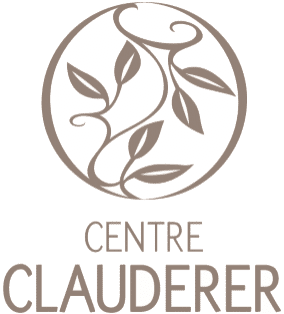Things to remember
An androgenetic hair loss affects around 50% of women (Cf. articles published by the learned medical society British Menopause Society -2022-) around the age of fifty, at the menopause.
The reduction and then cessation of ovarian oestrogen secretions creates an imbalance in favour of androgen hormones.
This imbalance can lead to hair thinning or exacerbate existing hair loss.
At the first sign of hair loss, we advise you to consult us, as it will not stop on its own. But we can help to stabilise it with a local anti-androgen treatment.
Symptoms of menopausal hair loss
At the menopause, with thecessation of ovarian secretions, women lose 80 % of their oestrogen. Unfortunately, their androgen levels fall by only 10 to 30 %. The androgen/estrogen ratio therefore increases significantly. This imbalance can lead to symptoms of hyperandrogenism (excess male hormones), particularly in terms of hair density for women with a genetic predisposition to an excessive sensitivity of their scalp to androgen hormones.
For these women, the imbalance they experience often has serious consequences. It can accentuate or cause a progressive thinning of their hair, their female hormones no longer act as an antidote to limit the harmful effects of androgens. This is known as androgenetic alopecia, and these problems generally occur before or around the age of fifty.
La hair loss can begin four or five years before the menopause, at the time of the premenopause, often when menstruation starts to become less regular, or even before.
The intensity of the disorder varies greatly, depending on the strength of the predisposition and the stress it generates. It can range from a slight thinning of the hair to significant loss of part of the head.
What is androgenetic alopecia?
This hair loss is due to androgens, the male sex hormones also secreted by women in small quantities.é. On scalps receptive to their action, these hormones weaken the hair, making them thinner and, ultimately, less numerous. The areas affected are the top and vertex of the head, more rarely the sides of the head and the forehead.
What to do about hair loss during the menopause?
The first thing to do is to make sure, by means of a in-depth diagnosis of your hair and an analysis of their roots, that it is not, for example, a question of a seasonal hair loss or a hair loss due to iron deficiency or a medication but a long-term hormonal problem. In this case, better to react quickly because your disorder will not stabilise on its own. The process may slow down and seem to stop for a while, but it will always start again if it is not treated.
Treatment of menopausal hair loss
To neutralise the degradation process, we need to intervene where the life of the hair takes place: the root and the hair follicle.
Local treatment
With an anti-hair loss treatment it is possible to treat the three vital functions of hair and to generate, in areas where hair is becoming thinner, dense and vigorous hair regrowth It is now even possible to reactivate dormant hair follicle, see Clauderer serums N°6R and N°7R.
Hormone replacement therapy (HRT)
At the menopause, certain hormone replacement therapies (HRT) or menopause treatments (MHT) can also help reduce negative action that androgens exert on hair follicles. However, these treatments can only be considered ifsubject to a full medical check-up and rigorous monitoring by your gynaecologist.
On the other hand, as for the contraceptive pill, not all HRT is good for your hair, far from it. On the other hand, some of them can have no negative effects or even bring about a definite improvement in your hair problem. If you decide to follow one of these treatments, it's best to know which ones will be good for your hair.
List of hormone replacement therapies (HRT) and their effects on your hair
It is the composition of the progestogen that counts, as well as its dosage. Some progestogen molecules have a positive effect on hair, while others have a negative effect. Centre Clauderer has established a rating system for hormone treatments, according to the effect they may have on hair cycles, with positive ratings (anti-androgenic effect), neutral ratings (no androgenic effect) and negative ratings (with a tendency to 'androgenise', which should be avoided in your case).
These quotations are established strictly from the point of view of hair. You should always follow your doctor's advice to find out which medicine is best suited to your personal case. This dossier was drawn up in collaboration with Dr C. Magot, a gynaecologist.
Estrogen-progestins
| BRAND | CONTRIBUTION | ESTROGEN | PROGESTATIVE |
|---|---|---|---|
| ACTIVELLE | NEGATIVE | 1mg estradiol | 0.5mg noresthisterone acet. |
| AVADENE | POSITIVE | 1-1mg estradiol | 0.025mg gestodene |
| ANGELIQ | POSITIVE | 1mg estradiol | 2mg drospirenone |
| CLIMASTON | POSITIVE | 1mg estradiol | 5mg dydrogesterone |
| CLIMATE | POSITIVE | 2mg estradiol | 1mg cyproterone acetate |
| CLIMODIENE | POSITIVE | 2mg estradiol | 2mg dienogest |
| DIVINA | NEUTRAL | 2- 2mg estradiol | 0-10mg medroxyprogesterone |
| DIVISEQ | NEUTRAL | 2- 1mg estradiol | 0-10mg medroxyprogesterone |
| DUOVA | NEGATIVE | 1mg estradiol | 5mg medroxyprogesterone |
| FEMOSTON | POSITIVE | 1 mg estradiol | 5mg dydrogesterone |
| FEMOSTON LOW | NEUTRAL | 0.5 mg estradiol | 2.5mg dydrogesterone |
| FEMSEPTCOMBI | NEGATIVE | 50 µg/day estradiol | 10 µg/day levonorgestrel |
| FEMSEPTEVO | NEGATIVE | 50 µg/day estradiol | 7µg/day levonorgestrel |
| KLIOGEST | NEGATIVE | 2mg estradiol | 2mg nomgestrol |
| NAEMIS | NEGATIVE | 1.5mg estradiol | 3,5mg norethisterone |
| NOVAFEMME | NEGATIVE | 1mg estradiol | 1mg norethisterone |
| TRISEQUENS | NEGATIVE | 2-2-1mg estradiol | 0-1-0mg norethisterone acetate |
Progestins alone
| BRAND | CONTRIBUTION | PROGESTATIVE |
|---|---|---|
| ANDROCUR | POSITIVE | 50mg cyproterone acetate |
| CHLORMADINONE Gé | NEUTRAL | 5mg chlormadinone acetate |
| COLPRONE | NEUTRAL | 5mg medrogestone |
| DUPHASTON | POSITIVE | 10mg dydrogesterone |
| ESTIMA | NEUTRAL | 100 - 200mg natural progesterone |
| EVAPAUSE Gé | NEUTRAL | 100mg natural progesterone |
| LIVIAL | NEGATIVE | 2,5mg tibolone |
| LUTENYL | NEGATIVE | 5mg nomegestrol acetate |
| LUTERAN 5 | NEUTRAL | 5mg chlormadinone acetate |
| MENÆLLE | NEUTRAL | 100mg natural progesterone |
| NOMEGESTROL | NEGATIVE | 5mg nomegestrol acetate |
| PROGESTERONE Gé | NEUTRAL | 100mg natural progesterone |
| SURGESTONE | NEGATIVE | 0,500mg promégestone |
| UTROGESTAN | NEUTRAL | 100 - 200mg natural progesterone |
Estrogens alone
They are all hair-neutral, whatever their method of administration: tablet, patch, gel, nasal or vaginal. Always combined with a progestogen (except in the case of hysterectomy).
Menopause adjuvant treatment
| BRAND | CONTRIBUTION | COMPONENT |
|---|---|---|
| ABUFÈNE | NEUTRAL | 400mg beta-alanine |
| INTRINSA | NEGATIVE | testosterone 8.4 mg |
Answers to your questions about the menopause and hair
Does every woman lose hair at the menopause?
Not all women lose their hair at the menopause. This only applies to women with genetic predisposition to the negative action of androgens on their hair follicles. For some women, this predisposition may have manifested itself before the menopause and turned into prolonged hair loss, during childbirth for example. For others, it is really during the menopause, at the time of the almost total disappearance of their ovarian secretions that hair problems are triggered. This is because stopping hair production leaves the way clear for androgens, whose secretions remain virtually unchanged. The imbalance between male and female hormones can then lead to chronic alopecia.
What can be done to combat menopausal hair loss?
Most of the time, women experience hair loss at the menopause with great anxiety, seeing it as an additional stigma attached to their age. That's why, as soon as they become aware of the problem, we advise them to follow a local anti-androgen treatment because their loss of hair density will not stop on its own and can only get worse. This treatment will inhibit the negative action of androgens in the hair-producing cells, allowing the hair to return to normal size and life cycles. At the same time, hormone replacement therapy (HRT), if judiciously chosen, can also help preserve as much hair as possible.

